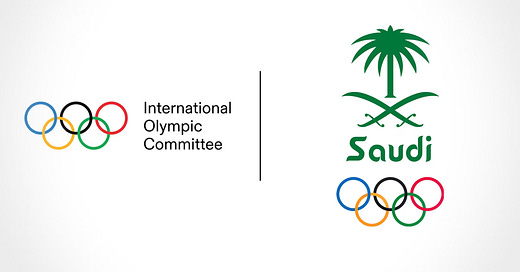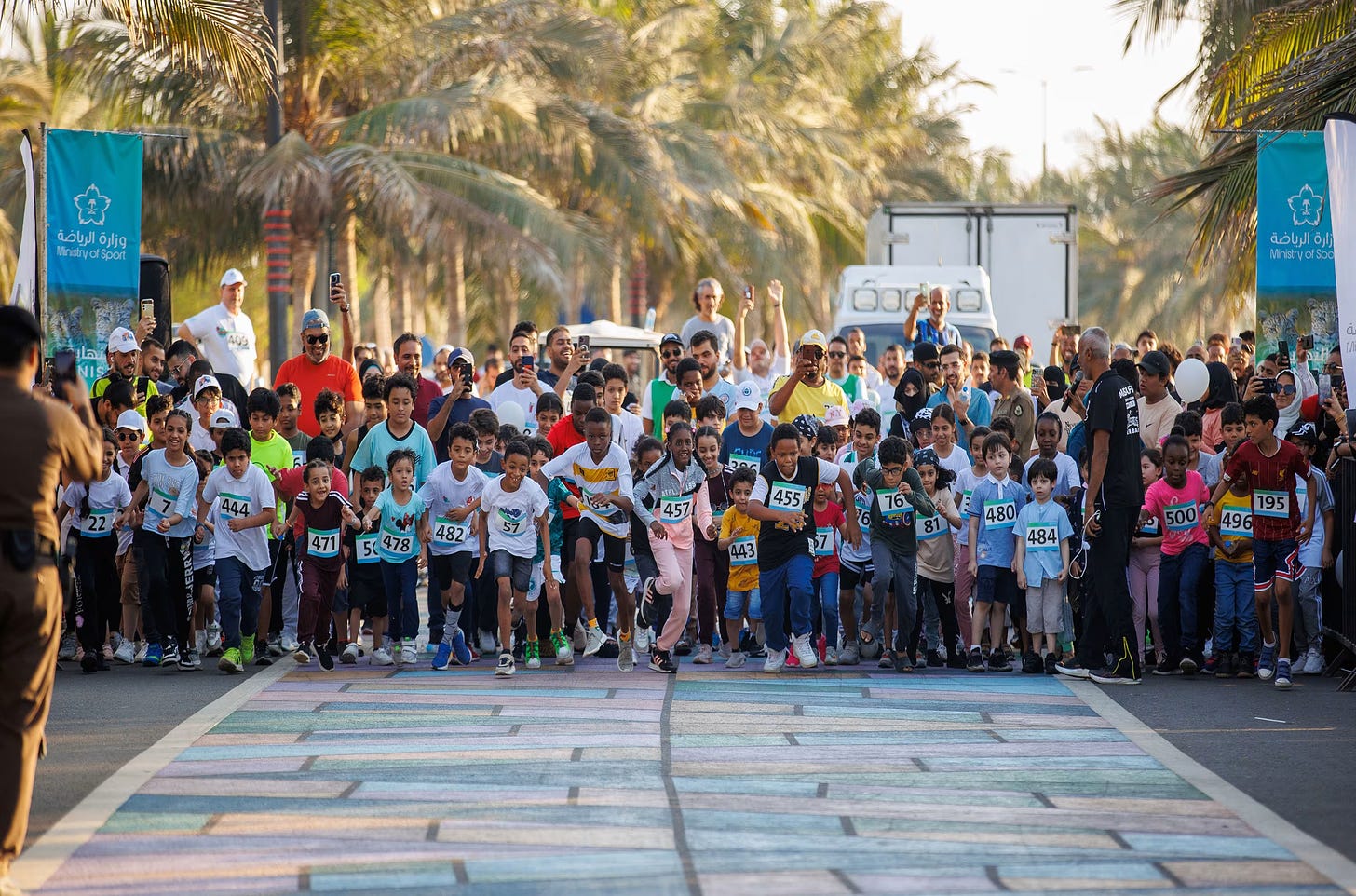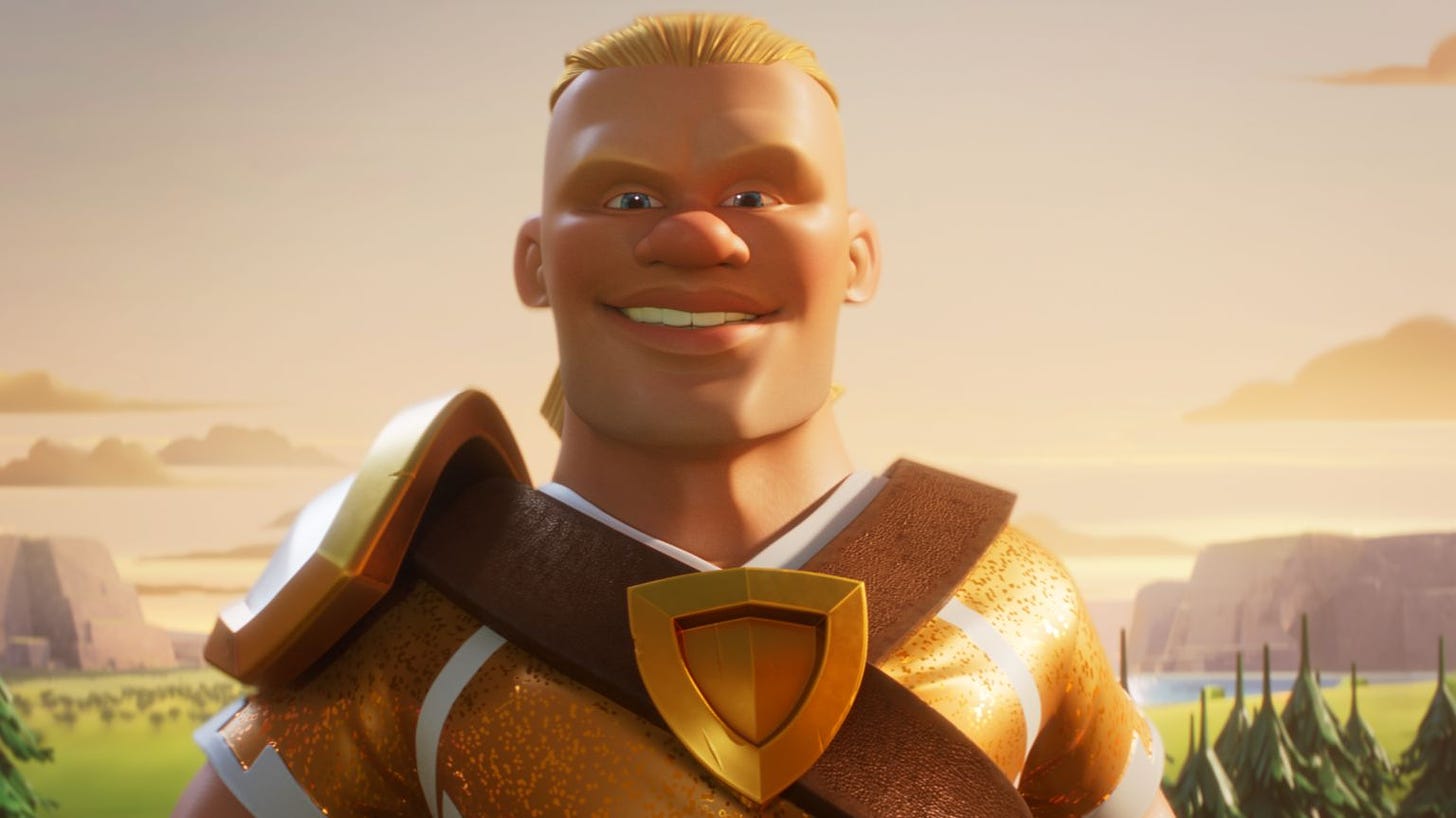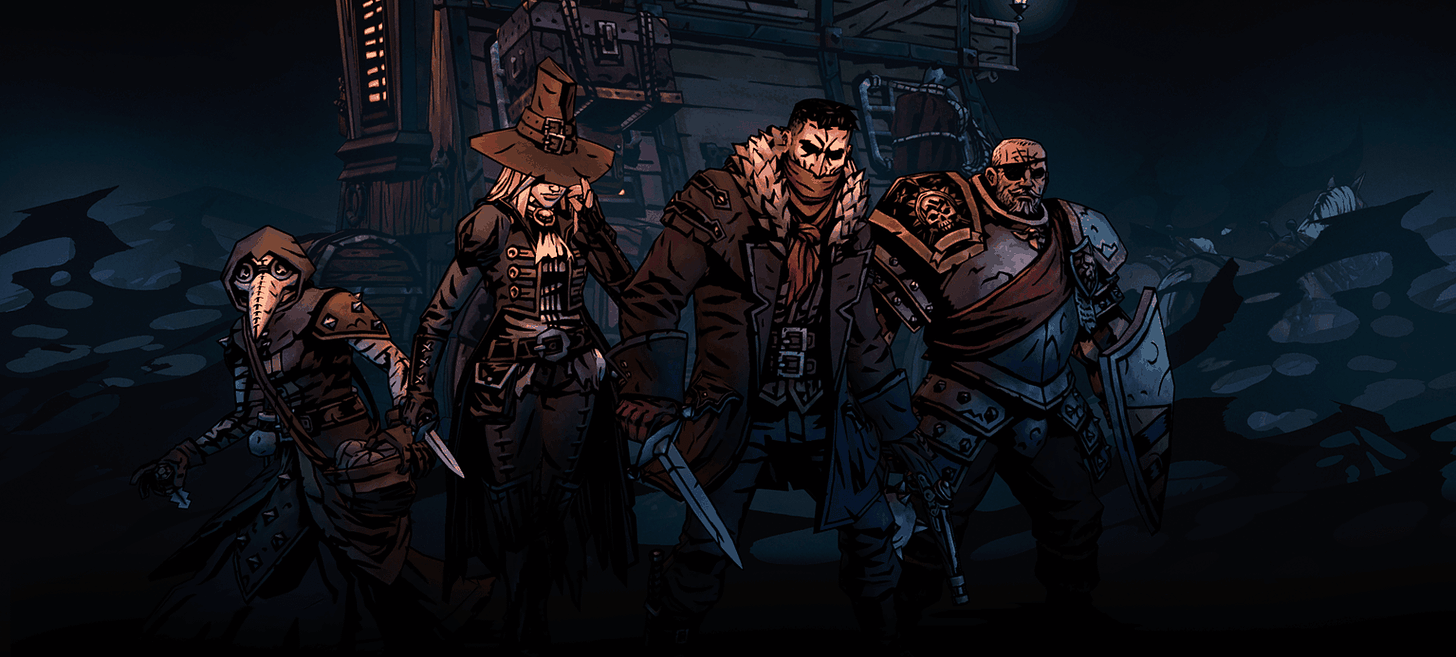Note: VGIM was edited at 11:31am on Thursday 18th July to amend a reference to VLOPs in the EU stories to gatekeepers as it should have been.
Explaining the creation of the first official virtual Olympic Games
Scottish VFX firm Axis Studios surprisingly shutters, 162 jobs lost
Dive deep into Darkest Dungeon 2 in the week’s releases
Good morning VGIM-ers,
Things are starting to hot up over in VGIM towers, just in time for the long overdue arrival of The Great British Summer.
Next Thursday, I’m going to be making an announcement that ranks somewhere near the top of the list of stuff I’ve ever personally or professionally done. Eeep.
But for now, I’m making a teeny announcement this week that you can benefit from practically instantly.
I’ve launched a VGIM referral programme to reward you for sharing the newsletter with colleagues, friends and enemies.
Previously, sharing VGIM used to only bring a happy song to your lips and a warm feeling to your cold, barren hearts.
Now, whenever you share the newsletter and Substack you get both of those things and credit for sharing the newsletter - giving you the chance to get VGIM Insider access for free (once you’ve talked enough people into signing up).
Here’s how it works:
If you drive 5 newsletter sign ups, you get 3 months of VGIM Insider pro bono.
Generate 8 VGIM subscribers and you’ll receive 6 months of complimentary paid subscription.
Deliver 12 readers into my arms and you can delight in 12 months of totally free Insider access.
Ready to get referring? Hit the button below and share VGIM via your social media, your Teams or Slack channels and the family WhatsApp group where your uncle shares conspiracy theories.
And don’t forget to be back here this time next week. I promise the news I’ve got for you is corking.
Anyway, let’s crack on with the big read.
The big read - Welcome to the Olympic Esports Games
“We cannot have in the Olympic programme a game which is promoting violence or discrimination. So-called killer games. They, from our point of view, are contradictory to the Olympic values, which cannot be accepted.”
Those were the words of International Olympic Committee President, and former professional sword fighter, Thomas Bach on 1st September 2018 when he was asked by the Associated Press about whether the Olympics would follow the Asian Games by adding an esports element to their programme.
Fast forward nearly six years to Friday 12th July 2024 and it’s fair to say Bach has changed his tune.
The IOC announced that the first official Olympic Esports Games will take place in Saudi Arabia next year in partnership with the country’s National Olympic Committee (NOC).
In a statement released last week, Bach said that the IOC was looking forward to working with a country with “expertise in the field of esports” to create a virtual version of the games which ensures “Olympic values are respected, in particular, with regard to the game titles on the programme, the promotion of gender equality and engagement with the young audience.”
The announcement represents quite the reversal for both Bach and the IOC. The question is how the organisation has shifted in half a decade from being sceptical of including games in the Olympics to creating a dedicated version of it for Esports enthusiasts.
In short, the IOC has recognised that the commercial and organisational model underpinning the Summer and Winter Games is under threat as host cities shy away from bidding and audiences decline.
By creating the Olympic Esports Games, the IOC hopes to reach new audiences via digital means, create a more sustainable model for running the Games more broadly and open up a new revenue stream - making it an important part of the organisation’s future whether it succeeds or otherwise.
Finding the fun(ding)
The IOC has a peculiar challenge at the heart of its commercial model. The IOC’s biggest strength is that it is the organiser of the Summer and Winter Olympic Games, two immensely popular global sporting events that have captured the attention and imagination of a worldwide audience of fans, brands and businesses for more than a century.
But the IOC’s strength is also its biggest problem. The immense size, scale and appeal of the Olympic Games has turned a previously fair-spirited global sporting contest into a lumbering multi-billion dollar millstone: creating tension between the IOC and the host cities who wear it around their necks.
This is outlined in an excellent piece from The Council on Foreign Relations exploring the economics of hosting the Olympics Games, which shows how host cities foot the bill for the IOC’s revenue generating behemoth.
To start, the piece shows how the cost of successfully bidding for and hosting the Olympic Games has ballooned to almost ludicrous levels.
The IOC’s historic fondness for a lavish (and sometimes corrupt) bidding process, preference for the construction of new venues and unwavering demands in regards to the logistics of the games - such as providing 40,000 rooms for participating athletes - has landed its hosts with enormous bills.
Tokyo spent $13bn hosting the 2020 games (which took place in 2021), while the Rio games cost a staggering $39bn as the city threw together infrastructure to meet the IOC’s stringent requirements.
To make matters worse, the return on investment for hosting the games has been proven to be minimal or outright negative for host cities.
In pure cash terms, the Tokyo event - which was admittedly damaged by Covid restrictions - generated $5.8bn in revenue in partnership with the IOC. This means it recorded a loss of more than $7bn for the city.
Furthermore, the supposed softer benefits of the games which are meant to cushion those direct costs (including long term boosts to tourism, jobs or GDP) have been difficult to prove - leading to a number of economists questioning whether hosting the games provides value to anyone other than the IOC.
And as if that wasn’t worrying enough for the IOC, declining interest in the games from broadcast audiences has weakened its core commercial position.
Viewership for the summer games has declined from its peak in London 2012, with Tokyo in 2021 reaching 3.05bn viewers compared to 3.2bn in Rio 2016. This is mirrored in the Winter Games too, with viewership for Beijing 2022 down by 40% in the US compared to the 2018 figure for Pyeongchang.
Obviously, these viewership figures are still pretty damn impressive. But given that broadcasting fees and sponsorship deals make up 92% of the IOC’s revenue, anything that points to declining viewership or interest is bad news for the organisation’s ability to generate income.
These three issues add up to one big problem for the IOC. The squeeze on the appetite for cities to host the Olympics and a downturn in audience interest from the games puts it in a position where its core business is at risk - forcing it to act to make the Games attractive again.
To try to resolve the problem, the IOC has launched a sustainability drive to push down the costs of hosting its main games.
In November 2023, the IOC released a report called the Olympic Agenda 2020+5. It made a number of recommendations on how to improve the economic sustainability of the Summer and Winter games generally.
This included encouraging host cities to re-use other sporting venues to lower costs, allowing for more events to be hosted in nearby facilities outside the host city to further reduce the need for new venues and use turnkey solutions from other hosts - such as online ticketing infrastructure - to drive efficiencies
But the IOC has also sought to make the games more sustainable by expanding into the digital sphere. And as it has done so, the prospect of hosting a digital Olympics rooted within popular video games rapidly gained traction.
Alongside its wider sustainability recommendations, the 2020+5 paper emphasised the importance of diversifying the audience of the Games through digital channels that directly put the Olympics on course for partnership with the games sector.
This is evidenced by Recommendation 9 within the paper, which provided two pages of detail on how to “encourage the development of virtual sports and further engage with video gaming communities.”
This included tips such as providing esports athletes with Olympic approved training materials, engaging with video game communities to encourage physical activity and guiding the sporting federations that feed into the Olympic movement to work with game developers making virtual counterparts.
As a result, the IOC reached a crossroads with competitive games and the Olympics programme: continue to be sceptical of its value or consider folding it into the movement to meet its diversification goals.
And in the end, with the support of a well funded nation with a stated goal to become a global video games and esports hub, it chose the latter - paving the way for last week’s announcement.
Playing with perception
How full-throated is the IOC’s support for an Olympic Esports programme then? The answer is more carefully balanced than the publicity suggests.
On the surface, the project has definitely received enthusiastic support from both the IOC and Saudi Arabia’s NOC.
The IOC’s decision to launch the Olympic Esports Games less than two years after running a week long test event in Singapore shows that it has understood the potential value of video games for reaching younger audiences.
Meanwhile, Saudi Arabia’s emergence as the host of Olympics Esports Games - from both its Government and its 23m players, according to the press release - is another reputational win for a country that has already invested extensively in the esports industry and the creation of the Esports World Cup to position itself at the heart of global competitive gaming.
Yet a gentle scratch beneath the surface of the announcement shows that the IOC is hedging its bet on virtual competition very carefully, especially in regards to its commercial underpinning.
The IOC has taken a number of low risk decisions to ensure the virtual games stand on their own two feet. While it has encouraged federations from physical sports to partner with virtual equivalents, the Olympic Esports Games stands separately from the combined Summer and Winter Games pool that the IOC has erected. This seals it off from the core business in case things go wrong.
The Esports Games have also been locked to one territory for an extended period of time. Instead of agreeing to host the games in Saudi Arabia in 2025 and then open up a bidding process for 2029, the partnership that the IOC has negotiated with Saudi Arabia runs for 12 years.
This does seem to stop other nations bidding for the games for some time, which could be controversial if the Esports Games are successful. But creating a short term ‘perpetual’ host for the virtual Olympics reduces the cost of hosting it significantly - reducing the risk while testing economist Andrew Zimbalist’s theory that all the Games could benefit from being based in a single locale.
Finally, the IOC may have approved an Esports games but it has not fully walked back its hesitancy towards games that do not align with the sports that are contested within the Summer or Winter games.
Bach’s comment in the press release that games should only be selected if they adhere to “Olympic values” is a lightly veiled attempt to encourage the Olympic Esports Games to follow the approach of the Singapore test event.
This means that the Esports Games will be more likely to feature titles that mimic real world sports (e.g. Tennis Clash), rather than traditional esports games like League of Legends, Counter Strike or DOTA 2. This shows that the IOC retains a conservative approach to video games, willing to risk its ability to reach its audience in favour of a ‘safety-first’ approach to its reputation.
So while the creation of an Olympic Esports tournament should be seen as a major step by the IOC, that perception should be tempered by the careful limitations that the organisation has put around the event.
Yes, the games could prove to be a blowout hit for the IOC and become a new string to its bow.
But it has built a structure that deliberately minimises its exposure to what it considers to be reasonably likely commercial and reputational risk - giving it plenty of room to step away from the project if it goes awry in the next decade.
Olympian effort
So what should we conclude from all of this? There are a few things worth noting.
The reputation of games and competitive video games is undoubtedly boosted by the creation of a dedicated Olympic Esports Games. It provides reputational lustre for the sector while also erecting a long term competition structure for parts of the industry to mobilise around - something that has been in short supply in esports over its relatively short life span.
But that uplift comes with strings attached. The IOC’s deal ties the fate of the virtual Olympics, and the wider games industry, to the fortunes of Saudi Arabia.
Any economic benefits will be balanced by growing scrutiny on the industry’s ties to the country, likely turning the topic of ‘gameswashing’ from a bubbling concern into an outright reputational crisis that the sector will be unable to avoid when the Games start next year.
Furthermore, the success of the whole programme likely relies on the IOC embracing the Esports games wholeheartedly - including building relationships with titles that more conservative figures in the organisation may not be fond of.
Bach’s time in charge of the IOC will come to an end next year when his elected term concludes.
If he is replaced by another conservative figure, there’s a chance that the Olympic Esports Games will struggle to break out of the Singapore restrictions - closing it off to the enormous audiences for ‘mainstream’ esports titles in a way that will hamstring its chances of being a success story.
But if Bach is replaced by someone such as David Lappartient, the IOC board member driving forward its games initiative who is seen as a viable candidate for the role of President, it may quickly pivot to embracing those ‘killer’ games that have helped make esports what it is today - opening up the full potential of the Esports Games in the process.
Whatever comes next, the IOC’s decision to push forward with an Olympic esports event is another fascinating example of what happens when an organisation outside of video games wrestles with the medium.
And whether the Esports Games turn the Olympics into a sporting triumvirate or falls flat on its face, it’s another brick in the wall for the argument that video games - whether loathed or loved - are making the cultural and commercial running across the world.
News in brief
The Axis falls: 162 people have been made redundant by Axis Studios after the company appointed administrators earlier this week. The Glasgow based business was a key player in the visual effects industry, supporting companies in film, TV and games to create a range of visual assets (including the Erling Haaland Clash of Clans trailer which released earlier this year).
India-eep trouble: Apple continues to get punted up the backside by competition regulators, with India the latest country to take its turn on the Cupertino giant. Reuters reports that a 142 page document from the Competition Commission of India’s (CCI) investigation into anti-competitive practices on the App Store has concluded that it ‘wields significant influence’ to force developers to ‘adhere to Apple’s unfair terms’, setting a course for the CCI to take action against it. We await the report’s official release eagerly…
Tik-Thwocked: And in more tasty competition news, TikTok has lost its appeal against being designated a gatekeeper by the European Commission. ByteDance contested that TikTok didn’t meet the thresholds to be defined as a gatekeeper meaning that it shouldn’t be covered by stringent rules that prevent it favouring its own service and force it to open up to third parties. The European Court of Justice disagreed, putting one of the biggest channels for video game discovery onto its Big Tech naughty list.
Scratching that Twitch: Eurogamer’s Ed Nightingale sat down with Twitch’s VP of Product and VP of Global Partnerships to discuss safety on the platform in the wake of the Dr Disrespect sexting scandal. The interview covers the practicalities behind Twitch’s trust and safety drive, as well as the future for the business in the wake of lay-offs and concerns over its long term viability.
Dead on arrival: Remember when I said a couple of weeks ago how baffling it was that Resident Evil 7 released on mobile? Turns out it was an odd choice. Neil Long from mobilegamer.biz has drawn on data from mobile analytics firm App Magic to estimate that under 2,000 people across the world have paid for it since it landed on the App Store. Whoopsie…
Movers and shakers
A quiet one this week but Ceri Hutton has started a new position as Design Director at Wolfrock Studios AND set up CH Consulting & Management Services…And Mariana Chucri is the new VP of Finance at Sandsoft…(Job move tips can be sent to george@videogamesindustrymemo.com)
Jobs ahoy!
Guild Esports is captialising on ESPORTS FEVER by hiring a Campaign Manager…Electronic Arts is hiring an EU Media Lead based out of its Guildford base…UGC agency Karta is recruiting a Sales Director to power its growth…Time to become the Senior Manager, Product Marketing at Amazon Games if that’s your thing…And it’s lights, camera, action for King who are looking for a Video Producer on a 12 month contract…
Events and conferences
A MAZE, Sheffield - 2nd August
GDL Indie Games Expo, London - 9th August
ChinaJoy, Shanghai - 26th-29th July
Serious Play Conference, Toronto - 12th-14th August
gamescom, Cologne - 21st-25th August
Games of the week
Darkest Dungeon 2: Sequel to depths diving dungeon roguelike plunges players into darkness just in time for Summer.
Flock: New multiplayer game that encourages you to capture flying creatures for your flock takes off across all platforms.
Anger Foot: Devolver published title channels Hotline Miami from a first person perspective in a colourful, but bloody, shooter.
Before you go…
I am concluding with a shout out for VGIM reader Anna Hollinrake, whose industry and invention must act as an inspiration for us all.
The artist and co-creator of forthcoming game Crescent County wrote to Larian Studios to ask if she could make a design for a T-Shirt of ‘muscle mummy Karlach’ in a remarkably punchy pitch.
Larian, delightfully, went for it. So if you’ve ever wanted a sexy Karlach t-shirt of your own, thank Anna and her decision to write an email with a subject line for the ages.








I like this idea of focusing on digital versions of traditional sports rather than the "killer" esports titles. If competitive gaming wants to be taken seriously by mainstream audiences, it needs some accessible candidates to act as the thin wedge.